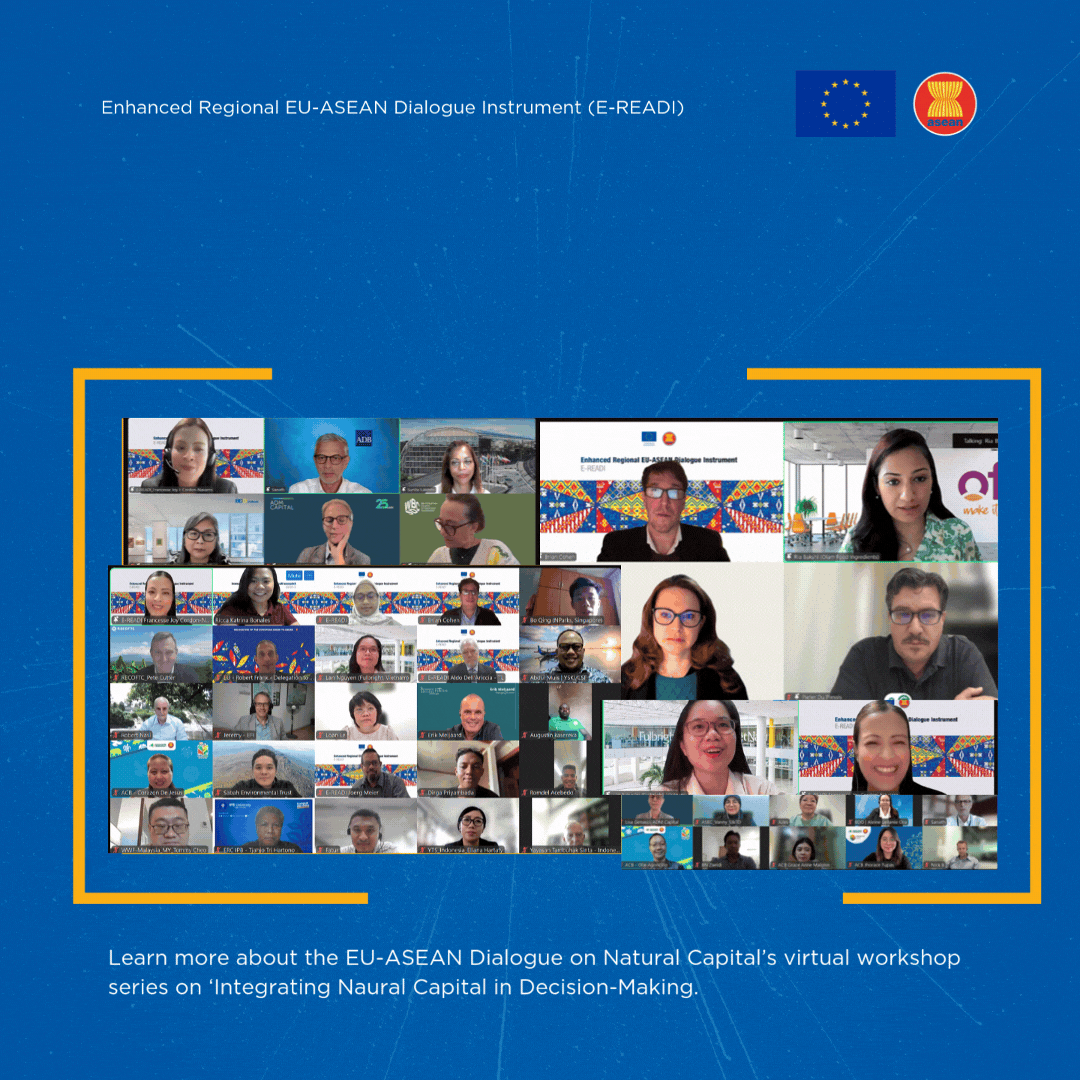EU-ASEAN Dialogue on Natural Capital Advances Sustainable Decision-Making

EU-ASEAN Dialogue on Natural Capital Advances Sustainable Decision-Making
Over 170 policymakers, private sector leaders, civil society, and academic representatives have signalled commitments to integrate natural capital into decision-making across Southeast Asia in three virtual workshops under the EU-ASEAN Dialogue on Natural Capital from October 2024 to February 2025.
ASEAN has developed a draft of an ASEAN Natural Capital Roadmap — an initiative poised to embed nature’s value into economic planning and decision making — with support from the European Union (EU) through the Enhanced Regional EU-ASEAN Dialogue Instrument (E-READI). The discussions in the three workshops aimed to collect input to refine the draft roadmap.
The first workshop on 14 October 2024 convened policymakers and experts from ASEAN Member States, the ASEAN Secretariat, the ASEAN Centre for Biodiversity (ACB), and the EU to discuss policy frameworks and regional coordination. The second workshop on 24 January 2025 focused on private sector actors and financial institutions, emphasising the role of businesses in ecosystem preservation and sustainable economic growth. Discussions highlighted best practices for companies to account for natural capital risks and opportunities in business operations, investment structuring, and financial decision-making. Case studies from pioneering firms demonstrated the potential for aligning profitability with sustainability. The third and final workshop on 18 February 2025 addressed civil society and academia, exploring their roles in fostering nature-positive governance and business practices. The need to work with local communities and to communicate in a language understood by non-environmental decision-makers were among the points highlighted.
Mr Robert Frank, Programme Officer at the Delegation of the European Union to ASEAN, remarked at the last workshop: ‘The European Union is committed to supporting ASEAN’s transition towards nature-positive economic models, and actively engaged in international efforts to promote the sustainable use of resources and combat biodiversity loss.’
Ms Corazon de Jesus Jr, Acting Director for Programmes of the ASEAN Centre for Biodiversity, emphasised: ‘This workshop is important for grounding conservation and sustainable natural resource management efforts and is critical for gathering inputs, particularly from civil society and academia, to the ASEAN Natural Capital Roadmap.’
With the completion of all three workshops, the significant insights and recommendations gathered will feed into the final version of the ASEAN Natural Capital Roadmap, set for official launch later this year. As every USD 1 invested in ecosystem restoration can return
USD 7–30 in economic benefits, the roadmap will serve as a guiding tool to ensure economic resilience, climate mitigation, and sustainable development across the ASEAN region.
With over 50% of the world’s GDP, approximately USD 44 trillion, depending on nature, unsustainable practices threaten vital resources. The ASEAN region is home to 20% of global biodiversity, making escalating deforestation and ecosystem loss special concerns.
-------------
The Association of Southeast Asian Nations (ASEAN) was established on 8 August 1967. The Member States of the Association are Brunei Darussalam, Cambodia, Indonesia, Lao PDR, Malaysia, Myanmar, Philippines, Singapore, Thailand and Viet Nam. On 31 December 2015, the ASEAN Community was formally established. The ASEAN Secretariat is based in Jakarta.
The European Union (EU) is the economic and political union of 27 Member States with a population of 449 million. Together, the EU has built a zone of stability, democracy and sustainable development while maintaining cultural diversity, tolerance and individual freedom. In 2012, the EU was awarded the Nobel Peace Prize for advancing the goals of peace, reconciliation, democracy and human rights in Europe. The EU is the world's largest trading bloc, and the world's largest source and destination of foreign direct investment. Collectively, the EU and its Member States are the largest donors of Official Development Assistance (ODA), providing more than half of ODA globally. The 27 Member States of the EU (in protocol order) are: Belgium, Bulgaria, Czech Republic, Denmark, Germany, Estonia, Ireland, Greece, Spain, France, Croatia, Italy, Cyprus, Latvia, Lithuania, Luxembourg, Hungary, Malta, Netherlands, Austria, Poland, Portugal, Romania, Slovenia, Slovakia, Finland and Sweden.
The Enhanced Regional EU-ASEAN Dialogue Instrument (E-READI) is an EU-financed programme that facilitates cooperation and dialogue between the EU and ASEAN in policy areas of joint interest. Drawing on the EU’s experience of regional integration, E-READI further strengthens both the ASEAN regional integration process as well as the overall ASEAN-EU strategic partnership.
CONTACT DETAILS
E-READI: [email protected]
